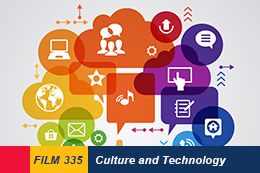Overview
Research and studies in relations of media, technology, and culture. Critical examination of cultural and communication technologies and the employment of technology within selected examples from film, television, and digital media.
This course shall examine the role played by technology, and especially communications technology, in the 20th and 21st centuries. We shall consider the ways in which not only has technology changed in this time frame, but also how our understanding of the world has changed through technology. Indeed, we will examine whether or not our notions of the world itself can now only be understood through technological mediation and whether it is possible to live an unmediated life. To these ends, we will begin the course with a consideration of key theories and concepts that address the relationship between culture and technology. We will then examine some distinct technologies of the 20th and 21st centuries and see how they have affected our understanding of our world and ourselves. Examples shall be drawn from film, television, and digital media.
Learning Outcomes
Upon completion of this course, students will be able to:
- Describe technology as expansive and explain how it shapes personal, societal, national, and global spheres
- Identify and engage in a variety of cultural media/texts--theoretical, artistic, and others
- Justify their roles as viewers/consumers/producers of cultural texts, including the ways in which they might be seduced into replicating--or potentially subvert--certain ideologies and power structures
- Research and analyze a topic of interest related to culture and technology, and communicate findings through academic writing.


